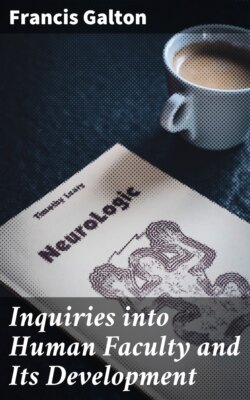Читать книгу Inquiries into Human Faculty and Its Development - Galton Francis - Страница 3
На сайте Литреса книга снята с продажи.
ОглавлениеPREFACE TO THE SECOND EDITION
After some years had passed subsequent to the publication of this book in 1883, its publishers, Messrs. Macmillan, informed me that the demand for it just, but only just warranted a revised issue. I shrank from the great trouble of bringing it up to date because it, or rather many of my memoirs out of which it was built up, had become starting-points for elaborate investigations both in England and in America, to which it would be difficult and very laborious to do justice in a brief compass. So the question of a Second Edition was then entirely dropped. Since that time the book has by no means ceased to live, for it continues to be quoted from and sought for, but is obtainable only with difficulty, and at much more than its original cost, at sales of second-hand books. Moreover, it became the starting point of that recent movement in favour of National Eugenics (see note p. 24 in first edition) which is recognised by the University of London, and has its home in University College.
Having received a proposal to republish the book in its present convenient and inexpensive form, I gladly accepted it, having first sought and received an obliging assurance from Messrs. Macmillan that they would waive all their claims to the contrary in my favour.
The following small changes are made in this edition. The illustrations are for the most part reduced in size to suit the smaller form of the volume, the lettering of the composites is rearranged, and the coloured illustration is reproduced as closely as circumstances permit. Two chapters are omitted, on "Theocratic Intervention" and on the "Objective Efficacy of Prayer." The earlier part of the latter was too much abbreviated from the original memoir in the Fortnightly Review, 1872, and gives, as I now perceive, a somewhat inexact impression of its object, which was to investigate certain views then thought orthodox, but which are growing obsolete. I could not reinsert these omissions now with advantage, unless considerable additions were made to the references, thus giving more appearance of personal controversy to the memoirs than is desirable. After all, the omission of these two chapters, in which I find nothing to recant, improves, as I am told, the general balance of the book.
FRANCIS GALTON.
